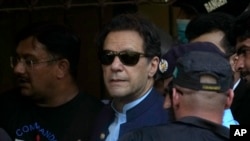A special Pakistani court Wednesday extended former prime minister Imran Khan's jail custody for two weeks to investigate him in connection with a secret diplomatic document allegedly missing from his possession while in office.
The judicial proceedings were conducted inside Attock prison, west of Islamabad, where Khan has been imprisoned since August 5 after being sentenced to three years for selling state gifts and allegedly concealing their proceeds. He refuted the graft charges as politically motivated and described the trial as unlawful.
The government cited "security concerns" for holding Wednesday's court hearing inside the century-old British colonial-era prison, notorious for its harsh conditions and housing convicted terrorists among its inmates.
On Tuesday, a federal court suspended Khan's three-year sentence and ordered his release on bail in what was hailed by his lawyers as a legal victory against frivolous graft charges. But authorities barred the 70-year-old politician from leaving prison, saying he was already under remand in the case related to the alleged missing secret diplomatic document.
The cricket-star-turned-prime-minister has been in a political showdown with the country's powerful military since a parliamentary vote of no-confidence toppled him and his coalition government in April of last year.
Khan accuses the military of orchestrating his ouster and instituting scores of criminal lawsuits against him since his removal from power, including terrorism and sedition, murder, and corruption charges.
The deposed prime minister and his supporters maintain the military is trying to squeeze him and his Pakistan Tehreek-e-Insaf party, the country's largest, out of national politics for questioning the institution’s meddling in politics.
The August 5 conviction on graft charges led the Pakistan Election Commission to swiftly ban Khan from running for office for five years under relevant laws. He has appealed the conviction, which led to the suspension of his sentence on Tuesday.
The diplomatic document case accuses Khan of making public a confidential cable, internally known as a cipher, for political gains in breach of the country's Official Secrets Act.
His close aide, former foreign minister Shah Mahmood Qureshi, has been arrested and interrogated for his alleged role in the case.
Since his ouster, Khan has discussed the cipher content in public rallies and media interviews as evidence of his claim that the United States engineered the toppling of his government.
The cipher purportedly contained a threat from the U.S. to oust Khan from power for visiting Russia on the eve of the Ukraine war. Written by Islamabad's ambassador to Washington, it documented a meeting between him and U.S. State Department officials.
The purported cipher quoted the U.S. officials asking the Pakistani ambassador to tell his military leadership they should topple Khan's government through a no-confidence vote, charges Washington and the current administration in Islamabad have rejected.
Khan dismisses allegations of misplacing a copy of the cipher or leaking any official secrets. He maintains that cipher messages are written in coded language and cannot be removed from the safety of the foreign ministry.
Former Pakistani diplomats back the assertions, saying that only a summary of the cipher is normally shared with the prime minister and a few other top officials, not the original cable.
Before his ouster, Khan had formally dispatched copies of the cipher summary to the country's chief justice, the military chief, and the house speaker, among others, asking them to order an investigation to determine who in Pakistan facilitated the alleged U.S. conspiracy to remove him from office.
At the direction of the country's national security committee, comprising top civilian and military leaders, the Khan government summoned the U.S. ambassador in Islamabad to the foreign ministry to formally protest the threatening message and Washington's alleged interference in Pakistan's politics.
Earlier this month, while responding to the allegations, the U.S. State Department said that it had objected to Khan's visit to Moscow but had nothing to do with his removal from power weeks later.
"We expressed concern privately to the government of Pakistan as we expressed concerns publicly about the visit of then-Prime Minister Khan to Moscow on the very day of Russia's invasion of Ukraine. We made that concern quite clear," State Department spokesman Mathew Miller said.
Khan’s attorneys have denounced the government for conducting the court hearing inside the jail, claiming it proves his assertions that the U.S. plotted his removal and that Pakistani authorities want to keep the truth from the public by not holding an open trial.




